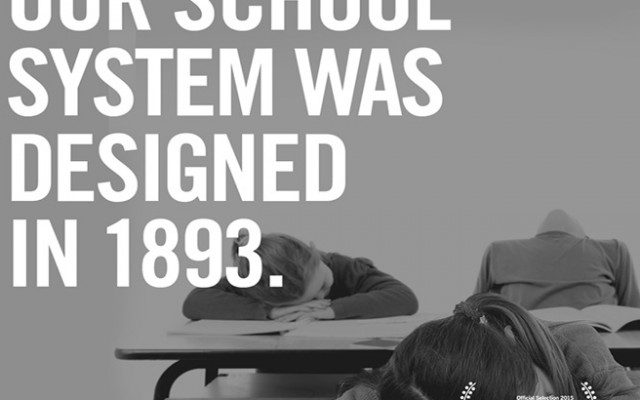Today is my favorite day on the Wheeling Country Day School campus. Today is LEGO robotics competition day – otherwise known as failure day. It is the failure that makes me love it. In a timed trial small groups of ten year olds publicly face challenges for which they have either successfully programmed their robots to complete, or they have not. If they haven’t, there is no finger pointing, no crying and no quitting. There is fast collaborative problem solving and the chance to learn from mistakes. And there it is. The reason I love LEGO day. Children own the lesson that failure isn’t fatal, but rather an avenue for learning. Grades play no part in it at all.
It is this type of problem-based collaborative learning that lies at the heart of the projects showcased in the educational documentary, Most Likely to Succeed, which was screened Wednesday night at Towngate Theater. The sold out showing was jointly presented by The Linsly School and Wheeling Country Day School in collaboration with West Liberty University’s College of Education and Oglebay Institute.
Within the first five minutes of the movie, audience members are reminded that the world has changed drastically since our modern school system was developed in 1893, yet the industrial model of school has not adapted. Called into question are standardized tests, segregated disciplines, textbooks and memorization itself.
Quickly the film builds a sense of consensus that indeed our school system is outdated at the student’s expense. At that point the film’s focus switches to the narrative of two ninth grade students at High Tech High, an innovative high school in San Diego. Together with their classmates they are challenged to take on an ambitious, project-based assignment that fosters critical thinking skills rather than rote memorization in preparation for a public showcase of their combined humanities and physics course. Greg Whiteley, the film’s director, writer and producer, juxtaposes clips of students bent over a math test with these freshmen who are actively and authentically learning. The former is on the continuum to college acceptance. The film suggests the latter leads from purposeful learning to a fulfilling life.
The message is clear – Whiteley finds the latter to be the better preparation for a successful future. Linsly Headmaster Justin Zimmerman warned the audience before its start that parts of the film would make parents and teachers uncomfortable. On the screen we watched parents question High Tech High teachers about the content a student was missing by focusing on depth instead of breadth. We could feel the parental anxiety that this alternative charter school might be a risk that won’t pay off in the college admissions game. Just when you are about to side with the skeptics and stick with what we know, the film presents the counter argument. Memorized content doesn’t stick. Whiteley shares the results of a study done at the Lawrenceville School where students were asked to retake their science exam three months later. The average score dropped from a B+ to an F. They didn’t know the material, they had only done well on the test.
When the dust settled at the end of the film, audience members were not unanimously in favor of an educational revolution to emulate High Tech High, but they were talking about the need for change. School that worked for generations was not going to serve us in the same way in this information age where we can program a computer named Watson to humiliate the legendary Jeopardy champion, Ken Jennings.
At its heart Most Likely to Succeed asks us to hold on to a basic contradiction. We were educated in the traditional way, the one designed in 1893. It was good enough for us. I sat in rows, listened to lectures, memorized content and demonstrated my knowledge on paper and pencil tests – knowledge I probably forgot within three months. I went to Princeton University, so for many of you reading this that proves the model was a success. The thing is the “workforce” a ten year old will enter after high school or college will be vastly different than the one I entered, and will only continue to change and reinvent itself in the years ahead. The rate of change is faster now than it has ever been in our history. Just as the industrial age changed our need for physical strength at work, the information age is forcing us to focus on our creativity – that human element for which the computer cannot be programmed. How do we prepare children for life after AP tests, SAT scores and college acceptance letters? How do we sit with the idea that I love this in theory, but not for my kid?
Was the intent of Most Likely to Succeed to urge all schools to follow the model of High Tech High? I don’t think so. Instead, the film forces us to acknowledge that students are not learning all that they should in the model we have. It is time to reimagine school.
Our purpose in bringing this screening to Wheeling was to start a conversation. To involve as many people in this as possible, Justin and I urge other schools and organizations to host a similar screening. We do not pretend to have the answer, but we are willing to hold the contradiction between what is and what is possible.
Pockets of innovation are a start – like a LEGO competition among ten-year-olds.
“Mrs. H-L” is the head of school at Wheeling Country Day.




